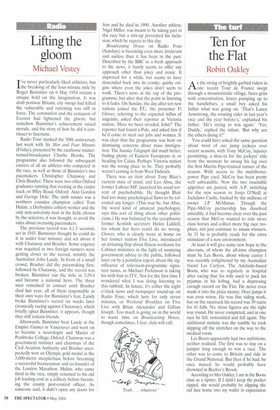Lifting the gloom
Michael Vestey
I've never particularly liked athletics, but the breaking of the four-minute mile by Roger Bannister on 6 May 1954 retains a unique hold on the imagination. It was drab postwar Britain, city smogs had killed the vulnerable and rationing was still in force. The coronation and the conquest of Everest had lightened the gloom, but somehow Bannister's achievement raised morale, and the story of how he did it continues to fascinate.
Radio Four marked the 50th anniversary last week with Six Men and Four Minutes (Friday), presented by the racehorse trainerturned-broadcaster Charlie Brooks. The programme also followed the subsequent careers of all six athletes who competed in the race, as well as those of Bannister's two pacemakers, Christopher Chataway and Chris Brasher. There were two other Oxford graduates running that evening at the cinder track on Iffley Road, Oxford: Alan Gordon and George Dole. The sixth runner was a northern counties champion called Tom Hulatt, a Derbyshire colliery worker and the only non-university man in the field, chosen by the selectors, it was thought, to avoid the rules about overusing pacemakers.
The previous record was 4.1.3 seconds, set in 1945. Bannister thought he could do it in under four minutes and set about it with Chataway and Brasher. Some urgency was required as two foreign runners were getting closer to the record, notably the Australian John Landy. In front of a small crowd, Brasher did the pacemaking first, followed by Chataway, and the record was broken. Bannister ran the mile in 3.59.4 and became a national hero. The three men remained in contact until Brasher died last year, all of them responsible in their own ways for Bannister's feat. Landy broke Bannister's record six weeks later (ironically racing against Chataway), which briefly upset Bannister, it appears, though they still remain friends.
Afterwards, Bannister beat Landy at the Empire Games in Vancouver and went on to become a neurologist and Master of Pembroke College, Oxford. Chataway was a government minister and chairman of the Civil Aviation Authority and Brasher unexpectedly won an Olympic gold medal in the 3,000-metre steeplechase before becoming a successful businessman and co-founder of the London Marathon. Hulam who came third in the race, simply returned to his old job loading coal at a colliery before becoming the county pest-control officer. As someone said, it didn't open any doors for him and he died in 1990. Another athlete, Nigel Miller, was meant to be taking part in the race but a mix-up prevented his inclusion, which he regrets to this day.
Broadcasting House on Radio Four (Sundays) is becoming even more irrelevant and useless than it has been in the past. Described by the BBC as a fresh approach to the news, it barely seems to offer any approach other than jokey and ironic. It improved for a while, but seems to have descended back into its cranky, quirky origins where even the jokes don't seem to work. There's news at the top of the programme, but after that the point in listening to it fades. On Sunday, the day after ten new nations joined the EU, the presenter Fi Glover, referring to the expected influx of migrants, asked their reporter at Victoria station, 'Have we been invaded, John?' The reporter had found a Pole, and asked him if he'd come to steal our jobs and women. It was clear that the programme was bent on dismissing concerns about mass immigration. The Sunday Telegraph did much better, finding plenty of Eastern Europeans in or heading for Calais. Perhaps Victoria station was the wrong place to be. They probably weren't coming in from West Dulwich.
There was an item about Tony Blair's current state of mind, and Leo Abse, the former Labour MP, launched his usual torrent of psychobabble. He thought Blair had too many psychological flaws to be tolerated any longer. (This may be, but Abse, the worst kind of amateur psychologist, says this sort of thing about other politicians.) He was balanced by the sycophantic former Scottish secretary Helen Liddell, for whom her hero could do no wrong. Glover, who is clearly more at home on her former station Five Live, introduced an irritating flop about fitness workouts for Cabinet ministers in the light of nannying government advice to the public, followed later on by a pointless report about the significance of television-programme signature tunes, as Michael Parkinson is taking his with him to ITV. Not for the first time I wondered what I was doing listening to this rubbish. In future, it's either the eight o'clock news and newspaper round-up on Radio Four, which lasts for only seven minutes, or Weekend Breakfast on Five Live with Brian Alexander and Gillian Joseph. Too much is going on in the world to waste time on Broadcasting House, though sometimes, I fear, duty will call.












































































 Previous page
Previous page